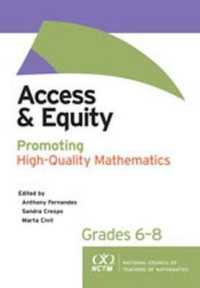- ホーム
- > 洋書
- > 英文書
- > History / World
Full Description
Bloomfield Academy was founded in 1852 by the Chickasaw Nation in conjunction with missionaries. It remained open for nearly a century, offering Chickasaw girls one of the finest educations in the West. After being forcibly relocated to Indian Territory, the Chickasaws viewed education as instrumental to their survival in a rapidly changing world. Bloomfield became their way to prepare emerging generations of Chickasaw girls for new challenges and opportunities. Amanda J. Cobb became interested in Bloomfield Academy because of her grandmother, Ida Mae Pratt Cobb, an alumna from the 1920s. Drawing on letters, reports, interviews with students, and school programs, Cobb recounts the academy's success story. In stark contrast to the federally run off-reservation boarding schools in operation at the time, Bloomfield represents a rare instance of tribal control in education. For the Chickasaw Nation, Bloomfield—a tool of assimilation—became an important method of self-preservation.








